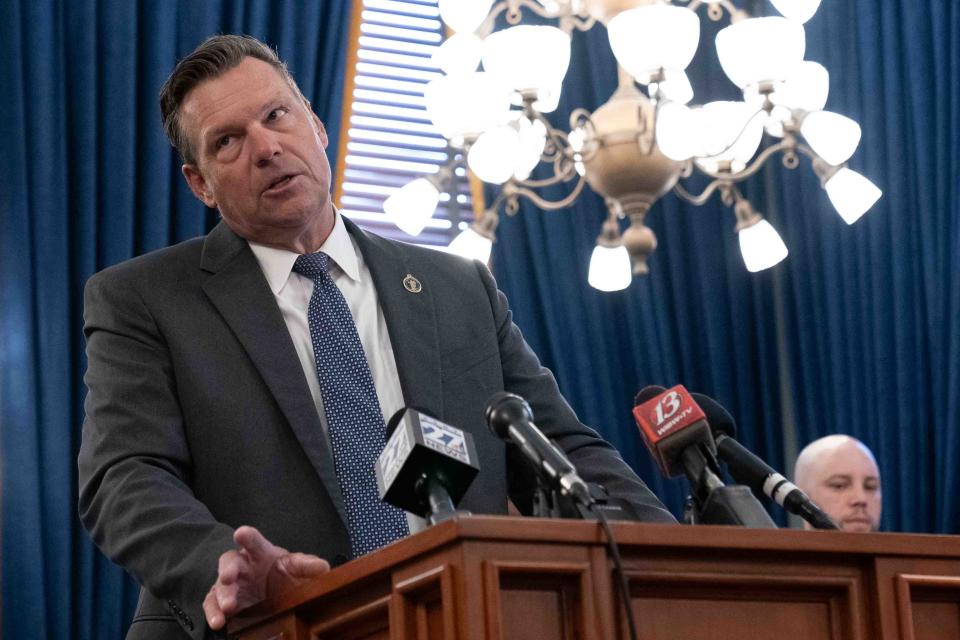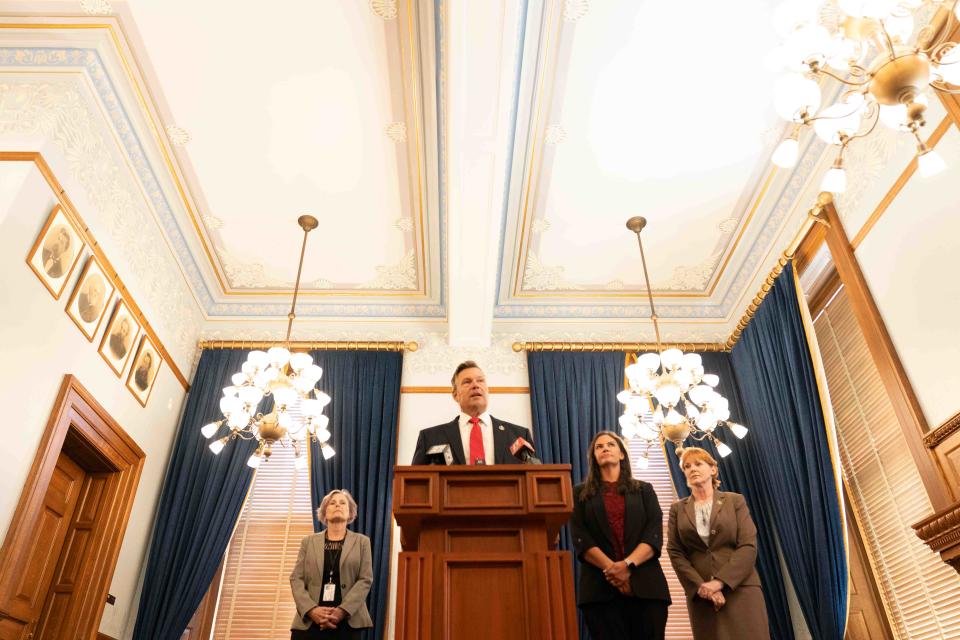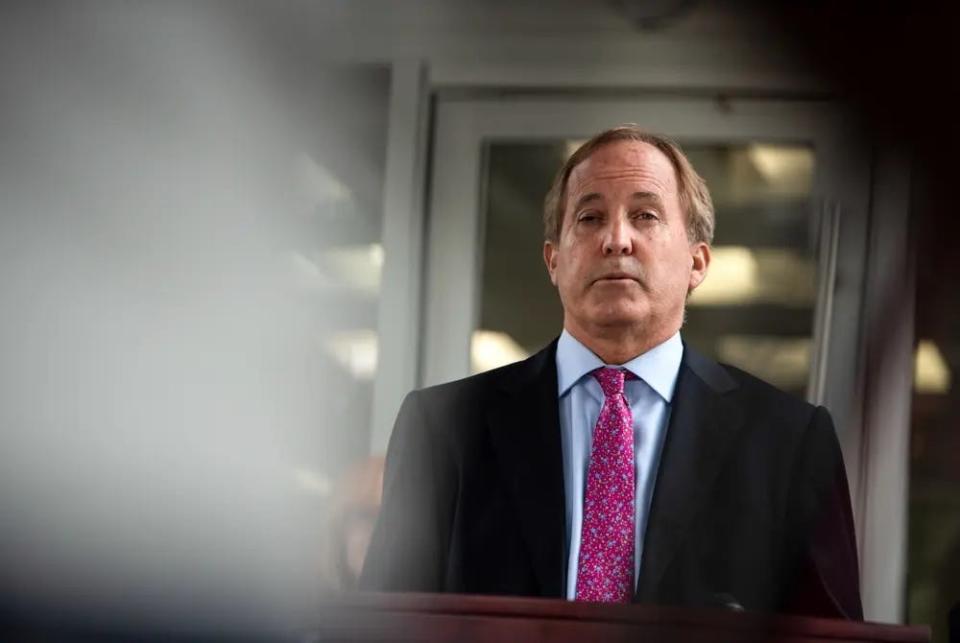Kansas sues Pfizer over COVID vaccine for what Kris Kobach calls 'misleading marketing'
- Oops!Something went wrong.Please try again later.
Kansas Attorney General Kris Kobach is suing Pfizer over its COVID-19 vaccine, alleging the company engaged in "false and misleading marketing."
Kobach announced the consumer protection lawsuit in a Statehouse press conference Monday morning. He said it will be filed in Thomas County District Court in western Kansas.
Kobach said that as people made decisions about whether to get vaccinated and which vaccine to choose, it was "imperative that Kansas making that decision receive the truth, they needed the truth, all Americans needed the truth. And in multiple respects, Pfizer did not provide the truth."

Pfizer administered over 3.3 million doses of its COVID-19 vaccine in Kansas, accounting for more than 60% of all the doses in Kansas.
The AG's complaint says that the company advertised that its vaccine was "life-saving" in three ads in 2021 that were seen by up to 190,000 people. Pfizer said the claims in the lawsuit are baseless and defended its representation of its vaccine in response to the lawsuit.
"We are proud to have developed the COVID-19 vaccine in record time in the midst of a global pandemic and saved countless lives," a Pfizer representative told The Capital-Journal. "The representations made by Pfizer about its COVID-19 vaccine have been accurate and science-based. The Company believes that the state's case has no merit and will respond to the suit in due course."
What Kobach is claiming to be misleading
Kobach said the "most egregious" examples of Pfizer's claims are that it's safe for pregnant women, that it failed to report instances of myocarditis, effectiveness of the vaccine against variants and that the vaccine protected against transmission.
Kobach cited a study on rats injected with full doses of the COVID vaccine and a collection of self-reported adverse side effects from pregnant women after taking the vaccine. The Centers for Disease Control and Prevention advise pregnant women to get vaccinated against COVID and that adverse reactions are similar to non-pregnant people who get vaccinated.
Myocarditis and pericarditis, which is inflammation of the heart muscle, have been found to be a rare side effect of COVID-19 vaccinations. A study found less than one per 100,000 people who took the vaccine experienced vaccine-related myocarditis.

But Kobach claims Pfizer knew that myocarditis was a potential risk factor when its CEO said he hadn't seen a "single signal" to alert them of negative reactions, even though the United States government had found potential links between the vaccine and myocarditis.
The original COVID vaccine became less effective at preventing transmission with subsequent variant strains of COVID, while still being associated with less severe cases of COVID-19. Kobach said up until late 2021 Pfizer didn't advertise the extent of dwindling effectiveness of the vaccine against delta and omicron variants.
Pfizer didn't test for transmission before the initial rollout, but its officials are quoted as saying that not getting a vaccine would put people around them at risk.
Social media censorship?
Kobach also alleged that Pfizer engaged in censorship of critical voices when its board member Scott Gottlieb complained to Twitter executives about a self-published column written by Scott Berenson, a former New York Times opinion writer and a former commissioner of the Food and Drug Administration under former President Donald Trump.
Pfizer participated in joint programs with government agencies and other companies that engaged social media companies, flagging content it deemed to be misinformation.
Following Texas' lead

Texas Attorney General Ken Paxton is pursuing a similar lawsuit against Pfizer, which the vaccine maker has said "has no merit."
Paxton filed the Texas case in November, alleging that Pfizer had misrepresented the effectiveness of the COVID-19 vaccine and attempted to censor public discussion around it. Paxton said the claim that the vaccine was 95% effective against infection was misleading.
Pfizer made the claim in November 2020 after a study with about 43,000 participants confirmed 170 cases, of which only eight happened among the vaccinated group. This was before the more severe delta variant or the more contagious omicron variant spread across the United States. When releasing the data, Pfizer gave notice that there are variables that could change the future effectiveness.

In Kansas the claims are similar, but the laws governing consumer protection vary by state.
"Texas' claims are made under their consumer protection act, so there are some differences. In addition we have prior settlements with Pfizer that were also pointing to in the complaint as additional illegal actions taken by Pfizer," Kobach said. "But the deceptive statements are the same, or virtually the same, in the two cases."
Federal courts picked up Texas' case in January, and Pfizer recently requested the case be thrown out because the people taking the vaccine weren't paying consumers.
Kobach said they're going after Pfizer but would do the same for other vaccine manufacturers if they believed they'd misled the public in a similar manner. Pfizer wasn't involved in Operation Warp Speed, a government program that fast-tracked vaccine development, which allowed Pfizer scientists to have less government supervision during development.
While Shawnee COunty is where Kobach typically files cases, he said he is trying the case in Thomas County due to the amount of work required for the case.
"This is going to be a very heavy load, so we wanted to go to a place with a lighter workload," Kobach said.
The Thomas County courthouse is in Colby, about 300 miles west of Topeka. It is part of the 15th Judicial District, which is comprised of seven counties in the state's northwest corner. The entire district has one chief judge, one additional district court judge and six magistrate judges.
Kansas hired controversial law firm to assist
The Kansas lawsuit is being assisted by the James Otis Law Group, a firm that Kobach contracted with for a secretive pharmaceutical case. Justin Smith of the James Otis Law Group is the lead attorney on the contract and was listed on the lawsuit filing.
The request for proposals had said the attorney general's office was "in the early stages" of an investigation into "alleged unfair or unconscionable acts or practices involving the drug manufacturer industry" targeting "a particular firm."
That St. Louis-based law firm was the only bidder to respond to the RFP. Prospective bidders were allowed to get additional information on the case in order to evaluate whether they would submit a bid.
The firm was founded by former Missouri solicitor general Dean John Sauer. He has represented former President Donald Trump, arguing that he should be immune from criminal prosecution for charges connected to the Jan. 6, 2021, insurrection. Sauer gained national attention when arguing in a federal appellate court that presidential immunity could hypothetically cover ordering Navy SEALs to assassinate a political rival.
The law firm's contract sets a 20% contingency fee, and the state is responsible for certain costs and expenses of the litigation.
This article originally appeared on Topeka Capital-Journal: Kansas AG Kris Kobach sues Pfizer over COVID vaccine marketing

